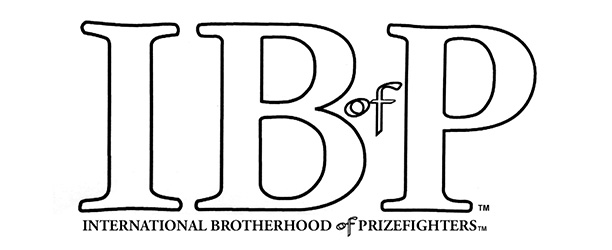Featured Articles
Destiny Played Role Reversal With the Careers of David Reid & Floyd Mayweather Jr.

There is a scene in “Rocky II” in which Rocky Balboa’s crusty old trainer, Mickey, tries to talk the retired heavyweight from Philadelphia out of attempting a comeback in a rematch against champion Apollo Creed. Demonstrating that Rocky’s left eye is too badly damaged for him to consider entering the ring against such a dangerous opponent, which could only end with Creed completing the demolition project he had so advanced in their previous slugfest, Mickey lands a couple of open-hand slaps to the left side of the plucky journeyman’s face.
“If I can do that, what do you think Creed would do to ya?” Mickey asks.
“I don’t know, hurt me bad, I guess,” Rocky mumbles.
“No,” Mickey says. “He’d hurt you permanent.”
By the time the closing credits rolled, of course, Rocky had upset Creed, swinging open the celluloid door for four more sequels in which “The Italian Stallion’s” bad eye never again was a hindrance to his performance, or even mentioned. Boxing’s longest-enduring movie hero will be onscreen again in the near future as “Creed,” the seventh installment in the movie series that not only goes the distance, but keeps extending it, is currently filming in Philly. In this one, Rocky is the trainer of Apollo Creed’s grandson, who hopes to step into his late Pop-Pop’s large shoes.
I can’t help but think of another Philadelphia fighter, 1996 Olympic gold medalist and former WBA super welterweight champion David Reid, whenever that I watch the aforementioned scene. I also think about an unscripted but indisputably accurate quote from still another Philly fighter, former middleweight and light heavyweight Bernard “The Alien” Hopkins, who made this astute observation after Reid had defended his newly won 154-pound title on a tougher-than-expected unanimous decision over Australia’s Kevin Kelly on July 16, 1999, in Atlantic City Boardwalk Hall. Kelly, a 30-1 underdog, kept circling to his right and scoring with overhand rights to Reid’s perpetually drooping left eyelid, which had already been operated on three times in unsuccessful attempts to fix a problem that would plague Reid throughout the remainder of his career, and beyond.
“If I was fighting David Reid next week or next month, what do you think I’m going to go for?” Hopkins asked, saying out loud what was already becoming common knowledge. “I think everybody he fights between now and the time he retires will go for a target that is so, so obvious.
“There’s two things you must have in this game: legs and headlights. You have to see what’s coming, and David Reid has problems seeing.”
But each of us sees what we want to see and hears what we want to see, at least occasionally, which explains in part why avoidable accidents continue to happen. In no sport is capricious misfortune more prevalent than in boxing, which is frequently described as a “hurt business.” Although no one can predict when a blossoming career takes a dramatic and sudden turn for the worse, there sometimes are telltale signs of slippage that those who should know better, if you’ll pardon the expression, turn a blind eye to. One fight, one round or even one punch can bring a prodigious talent suddenly to ruin. Even a seemingly minor injury, one that would not affect individuals in 95 percent of all other occupations, can be devastating if it impairs or restricts a fighter’s field of vision. Inside the ropes, a drooping eyelid can be tantamount to a career-killer.
He’ll hurt you permanent.
March 3 marks the 15th anniversary of the day that Felix Trinidad mortally wounded David Reid’s professional hopes and dreams with a one-sided, title-lifting unanimous decision at Caesars Palace in Las Vegas, a brutal beatdown in which the Puerto Rican superstar overcame a third-round knockdown to register four of his own, including three in the 11th round. Although the ventilator to which Reid’s once-towering aspirations were attached continued to function for four more bouts, he was, in effect, fighting with a pirate’s eye patch covering that left orb forever set at half-mast. Thus the young man whom some considered a brighter prospect than Floyd Mayweather Jr. coming out of the 1996 Atlanta Olympics quickly faded from view into a darker, more disturbing world mostly inhabited only by himself.
So here we are, 18½ years after Reid had vaulted to global prominence with a lightning-bolt right hand that put Cuba’s Alfredo Duvergel down and out in the final round of the light middleweight gold-medal bout. Under Olympic rules then in effect, scoring was done by computer, with judges at ringside pressing buttons to register legal punches landed within a specified time frame. Reid was 10 points behind entering that last round, and he was still insurmountably behind, 15-5, when he came in over the top with a parabola that landed with the concussive force of a runaway locomotive.
“We’d been through this plenty of times,” said U.S. Olympic coach Al Mitchell, who, ironically, had developed a father-son relationship with Reid since first working with him as an 11-year-old at a North Philadelphia recreation center, and would serve as his manager-trainer in the pros. “I told Dave, `Just go for the knockout. You can’t go any other way.’”
Said Reid: “I was going for the home run. I was down by 10 points. It’s hard to score 10 points in a round.”
The suddenness of his victory, so fraught with drama, was so … so … Rocky. Reid leaped in exultation, tears of joy forming at the corner of his eyes, and shortly after the he mounted the victory stand and the national anthem played, he was introduced to none other than the great Muhammad Ali.
“He told me, `You’re a bad boy,’” Reid said at the time, beaming a wide smile.
Just like that, the ghetto kid who had grown up with nothing appeared to be on the verge of having everything. Big-time promoters lined up to make lucrative offers, which in one instance included a veiled promise that his image would soon appear on boxes for Wheaties, the “Breakfast of Champions.”
“David is a national hero,” said Top Rank CEO Bob Arum, whose company initially seemed the favorite to land the man of the moment. Toward that end, Arum brought along one of his big guns, Oscar De La Hoya, to a meeting with Reid in New York a few days after Reid toppled Duvergel. De La Hoya had won the only American gold medal in boxing at the 1992 Barcelona Olympics, and the carrot dangling at the end of the Top Rank stick was the possibility of a megabucks Oscar-Reid match somewhere down the road.
“It’s going to happen,” De La Hoya told reporters after he had met and posed for photos with Reid. “I really believe that Bob Arum can see the big picture. I see the big picture, too. David Reid and I will fight someday. The only gold medalist from ’92 vs. the only gold medalist from ’96. Man, wouldn’t that be something? It won’t happen soon, but it will happen.”
Perhaps it would have, had Reid, then 22, gone with Top Rank. He instead chose to accept a larger deal from a newly formed promotional company, America Presents, that included a $1.5 million signing bonus and a reported $14.4 million over the five-year life of the contract.
America Presents president Dan Goossen predicted that Reid would make “at least $50 million” in the first five years of his pro career, which began on March 21, 1997, with an HBO-televised four-round, unanimous decision over Sam Calderon at the Taj Mahal in Atlantic City. Now dubbed “The American Dream,” Reid was, most agreed, on the fast track to superstardom, even if his left eyelid was already beginning its slow descent into the danger zone.
Top Rank’s consolation prize for missing out on Reid, however, turned out to be better than gold. Floyd Mayweather Jr., the bronze medalist in the featherweight division, had dropped a disputed 10-9 decision to reigning world amateur champion Serafim Todorov of Bulgaria in the semifinals, an outcome so odious that USA Boxing officials filed a formal protest to have it overturned (it wasn’t). And in the Olympics, gold always trumps bronze insofar as initial attractiveness to the pros is concerned.
“Mayweather got the shaft. I still can’t believe they screwed him like they did,” fumed U.S. coach Al Mitchell, who had deemed the Grand Rapids, Mich., native as the “best defensive fighter” on the American squad.
In retrospect, you have to wonder how things would have turned out for Reid and for Mayweather had Floyd won the gold he probably deserved and Reid not landed the thunderous shot some called the luckiest of lucky punches, and thus had to settle for the silver. In all likelihood, the vastly talented Mayweather would have gone on to the same incredible professional career he has achieved in posting a 47-0 record with 26 knockouts. At last look, he had a net worth of $280 million, which figures to be considerably boosted after his May 2 welterweight unification showdown with Manny Pacquiao, which could gross him upwards of $120 million. He is a surefire first-ballot inductee into the International Boxing Hall of Fame and, to hear him tell it, the best fighter ever to lace up a pair of padded gloves.
Reid’s high profile as an Olympic gold medalist no doubt contributed to his fighting for a world title in just his 12th pro outing, in which he outpointed WBA super welterweight champ Laurent Boudouani on March 4, 1989, in Boardwalk Hall. To all outward appearances, this was the same ebullient, chatty Reid as always as he yapped throughout the bout to a Frenchman who probably didn’t understand a world he was saying.
“I think it’s my confidence coming out,” Reid said of his in-fight verbosity. “Sometimes it’s good to talk trash. It shows I’m having fun doing what I do.”
But although not the first to follow what proved to be a familiar script, Boudouani added details to the plan as to how to fight Reid as he, too, kept stepping to his right to try to find a fuzzy or blind spot in the celebrated Olympic star’s questionable field of vision. The steady stream of wide rights that found the mark wiped the grin off Reid’s face soon enough, and convinced Mitchell that his guy’s coming-out party would include its share of popped balloons and limp streamers.
There also was continuing friction between Reid and Hopkins, who had appeared in separate bouts of an “HBO Boxing After Dark” show at the Taj Mahal on Jan. 31, 1998. Asked a few days beforehand if Reid might soon be ready to fight him, Hopkins, then the IBF middleweight champion and an America Presents stablemate of Reid’s, had offered his opinion that the 24-year-old was “on Similac” and needed to “get on whole milk” before he should even consider stepping up to fight him.
After Hopkins had stopped former world champion Simon Brown in six rounds and Reid had scored an eight-round unanimous decision over Robert Frazier, Reid, no longer smiling, vented his anger toward his fellow Philadelphian.
“Simon Brown is a bum,” Reid said. “Bernard beat up a bum. Every second of that fight, I could beat (Hopkins). He makes too many mistakes. It looks like when he swings, he closes his eyes and he’s scared. The man’s got no heart. He can’t fight. They say he’s the best middleweight, but, to me, he can’t fight.
“He said I was a little baby. This little baby would beat the drawers off him.”
A few days later, Hopkins tried to defuse the situation, at least a little.
“You want to know how I feel about David Reid?” he asked. “I think he’s a great-looking prospect, a future world champion. He has speed and power and he can go as far as he wants to in this game. David Reid is the future, but I am the present. This is my time; his time is coming. When I said he was a baby, all I meant is that he’s young and has to grow up in this sport a little. I didn’t mean nothing derogatory. It was all meant in good fun. If he took it wrong, what can I say?”
The “great-looking prospect” did win a world title, and defended it twice with points nods over Kelly and Keith Mullings before his management team decided it was time to roll the dice and put Reid in with an unbeaten and highly bankable fighter, Felix Trinidad, who was moving up from welterweight.
Prior to the welterweight unification matchup of Trinidad and De La Hoya, Goossen, in a bold mood, took out print ads that had Reid basically calling out both men.
“It had one of those surgeon general warnings: `Gaining weight will be hazardous to your health,’” Goossen said of the layout, in which a menacing Reid was flanked by smaller images of Trinidad and De La Hoya.
Were Goossen and Mitchell that confident that Reid – with just 14 pro bouts – was ready for an experienced champion like Trinidad, who at the time was 36-0 with 30 KOs? Or were they just going for a major financial score for their guy while the going was good? Reid was to receive a career-high $3 million for testing himself against Trinidad, a quantum leap up from his previous high of $450,000?
“In a year or two, if Dave does what I think he can, he’ll be ready for delivery to the (International Boxing) Hall of Fame,” Mitchell predicted. “He could walk away from this game at 30 financially secure for life and with no regrets. He’ll have fought everybody and done everything he possibly could.”
But Mitchell said something else before Reid defended his title against Trinidad, something more troubling, a tale of a 44-year-old grandmother from Philadelphia who had just lost the seventh member of her family – all under the age of 20 – to street violence. It was another reminder of the netherworld with which he and Reid were more than familiar.
“So many sad stories,” Mitchell said. “The same thing happens over and over, and you keep asking yourself why. I don’t know how to end crime and poverty and desperation. I wish I had that answer.”
Reid had his moments against Trinidad, the foremost of which was when he floored “Tito” with an overhand right in the third round, the kind of punch that had put away Duvergel. But Trinidad, who had been dropped six times previously as a pro but always come back to win, beat the count. And what followed for Team Reid was not pretty. Reid was all but gone in the 11th round, floored three times, with a grotesquely swollen right eye matching his constantly drooping left eyelid. But Reid attempted to fight back just enough that he was granted a chance to finish on his feet, which he did.
“As a man, as a fighter, the referee saw I could continue,” said Reid, both eyes nearly hammered shut, with the cut above his right eye requiring 10 stitches to close. “I wasn’t going to quit.”
The quitting came four fights later, when Reid was stopped in nine rounds by a moonlighting St. Louis cop named Sam Hill on Nov. 11, 2001, in that noted boxing hotbed of Elizabeth, Ind. The HBO cameras weren’t there to record the moment for posterity, Reid’s star power having dimmed to the point of darkness following his thrashing by Trinidad.
Spanish philosopher/poet George Santayana once wrote that those who do not learn from history are doomed to repeat it. Reid, a cousin of noted Philadelphia fighters Jimmy Young and Bobby “Boogaloo” Watts, was 26 when Trinidad basically ended his career, an outcome very much like what had happened to Meldrick Taylor, another Philly Olympic gold medalist (in Los Angeles in 1984) and world champion who had his prime beaten out of him in a super lightweight unification bout with Julio Cesar Chavez in 1990. Reid would never fight De La Hoya, or Hopkins, or his Olympic teammate, Fernando Vargas. Nor would he receive anywhere close to the $14.4 million his contract with America Presents reportedly was worth over five years, and certainly not the $50 million that Goossen had once so optimistically predicted. As it turned out, America Presents also was kayoed, the money man behind Goossen, Mat Tinley, cut off from funds for his cash-losing operation by the executors of his late billionaire uncle Bill Daniels’ estate.
Reid’s delivery to the IBHOF was canceled, as were his prospects of financial security for life. But Mitchell was right about one thing: “The American Dream” did indeed retire by the time he was 30. Broke and prone to bouts with depression and far-ranging mood swings, he now spends most of his time in his modest two-bedroom apartment in Marquette, Mich. He no longer has much, if anything, to do with the sport that made him an important figure on the world stage.
As always, the wheel goes round and round in boxing. And, as always, where it stops, nobody knows.
Featured Articles
A No-Brainer: Turki Alalshikh is the TSS 2024 Promoter of the Year

Years from now, it’s hard to say how Turki Alalshikh will be remembered.
Alalshikh, the head of Saudi Arabia’s General Entertainment Authority, isn’t everyone’s cup of tea. Some see him as a poacher, a man who snatched away big fights that would have otherwise landed in places like Las Vegas, New York, and London, and planted them in a place with no prizefighting tradition whatsoever merely for the purpose of “sportswashing.” If that be the case, Alalshikh’s superiors, the royal family, will turn off the spigot once it is determined that this public relations campaign is no longer needed, at which time the sport will presumably recede into the doldrums from whence it came.
Be that as it may, there is no doubt that boxing is in much better shape today than it was just a few years ago and that Alalshikh, operating under the rubric of Riyadh Season, is the reason why.
One of the most persistent cavils lobbied against professional boxing is that the best match-ups never get made or else languish on the backburner beyond their “sell-by” date, cheating the fans who don’t get to see the match when both competitors are at their peak. This is a consequence of the balkanization of the sport with each promoter running his fiefdom in his own self-interest without regard to the long-term health of the sport.
With his hefty budget, Alalshikh had the carrot to compel rival promoters to put down their swords and put their most valuable properties in risky fights and he seized the opportunity. All of the sport’s top promoters – Frank Warren and Eddie Hearn (pictured below), Bob Arum, Oscar De La Hoya, Tom Brown, Ben Shalom, and others – have done business with His Excellency.

The two most significant fights of 2024 were the first and second meetings between Oleksandr Usyk and Tyson Fury. The first encounter was historic, begetting the first undisputed heavyweight champion of the four-belt era. Both fights were staged in Saudi Arabia as part of Riyadh Season, the months-long sports and entertainment festival instrumental in westernizing the region.
The Oct. 12 fight in Riyadh between undefeated light heavyweights between Artur Beterbiev and Dmitry Bivol produced another unified champion. This wasn’t a great fight, but a fight good enough to command a sequel. (Beterviev, going the distance for the first time in his pro career, won a majority decision.) The do-over, buttressed by an outstanding undercard, will come to fruition on Feb. 22 in Riyadh.
Turki Alalshikh didn’t do away with pay-per-view fights, but he made them more affordable. The price tag for Usyk-Fury II in the U.S. market was $39.99. By contrast, the last PBC promotion, the Canelo vs. Berlanga fight on Amazon Prime Video, carried a tag of $89.95 for non-Prime subscribers.
Almost half the U.S. population resides in the Eastern Time Zone. For them, the main event of a Riyadh show goes in the mid- to late-afternoon. This is a great blessing to fight fans disrespected by promoters whose cards don’t end until after midnight, and that goes double for fight fans in the U.K. who can now watch more fights at a more reasonable hour instead of being forced to rouse themselves before dawn to catch an alluring match anchored in the United States.
In November, it was announced that Alalshikh had purchased The Ring magazine. The self-styled “Bible of Boxing” was previously owned by a company controlled by Oscar De La Hoya who acquired the venerable magazine in 2007.
With the news came Alalshikh’s assertion that the print edition of the magazine would be restored and that the publication “would be fully independent.”
That remains to be seen. One is reminded that Alalshikh revoked the press credential of Oliver Brown for the Joshua-Dubois fight on Sept. 21 at London’s iconic Wembley Stadium because of comments Brown made in the Daily Telegraph that cast a harsh light on the Saudi regime.
There were two national anthems that night, “God Save the King” sharing the bill, as it were, with the Saudi national anthem. Considering the venue and the all-British pairing, that rubbed many Brits the wrong way.
The Ring magazine will always be identified with Nat Fleischer who ran the magazine from its inception in 1922 until his death in 1972 at age 84. It was written of Fleischer that he was the closest thing to a czar that the sport of boxing ever had. Turki Alalshikh now inherits that mantle.
It’s never a good thing when one man wields too much power. We don’t know how history will judge Turki Alalshikh, but naming him the TSS Promoter of the Year was a no-brainer.
To comment on this story in the Fight Forum CLICK HERE
Featured Articles
The Ortiz-Bohachuk Thriller has been named the TSS 2024 Fight of The Year
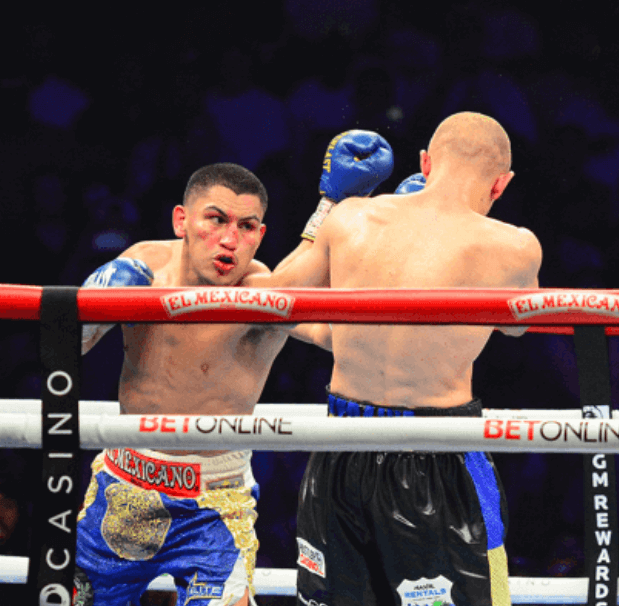
The Aug. 10 match in Las Vegas between Knockout artists Vergil Ortiz Jr and Serhii Bohachuk seemingly had scant chance of lasting the 12-round distance. Ortiz, the pride of Grand Prairie, Texas, was undefeated in 21 fights with 20 KOs. Bohachuk, the LA-based Ukrainian, brought a 24-1 record with 23 knockouts.
In a surprise, the fight went the full 12. And it was a doozy.
The first round, conventionally a feeling-out round, was anything but. “From the opening bell, [they] clobbered each other like those circus piledriver hammer displays,” wrote TSS ringside reporter David A. Avila.
In this opening frame, Bohachuk, the underdog in the betting, put Ortiz on the canvas with a counter left hook. Of the nature of a flash knockdown, it was initially ruled a slip by referee Harvey Dock. With the benefit of instant replay, the Nevada State Athletic Commission overruled Dock and after four rounds had elapsed, the round was retroactively scored 10-8.
Bohachuk had Ortiz on the canvas again in round eight, put there by another left hook. Ortiz was up in a jiff, but there was no arguing it was a legitimate knockdown and it was plain that Ortiz now trailed on the scorecards.
Aware of the situation, the Texan, a protégé of the noted trainer Robert Garcia, dug deep to sweep the last four rounds. But these rounds were fused with drama. “Every time it seemed the Ukrainian was about to fall,” wrote Avila, “Bohachuk would connect with one of those long right crosses.”
In the end, Ortiz eked out a majority decision. The scores were 114-112 x2 and 113-113.
Citing the constant adjustments and incredible recuperative powers of both contestants, CBS sports combat journalist Brian Campbell called the fight an instant classic. He might have also mentioned the unflagging vigor exhibited by both. According to CompuBox, Ortiz and Bohachuk threw 1579 punches combined, landing 490, numbers that were significantly higher than the early favorite for Fight of the Year, the March 2 rip-snorter at Verona, New York between featherweights Raymond Ford and Otabek Kholmatov (a win for Ford who pulled the fight out of the fire in the final minute).
Photo credit: Al Applerose
To comment on this story in the Fight Forum CLICK HERE
Featured Articles
Women’s Prizefighting Year End Review: The Best of the Best in 2024

Women’s Prizefighting Year End Review: The Best of the Best in 2024
It’s the end of the year.
Here are our awards for the best in women’s boxing. But first, a rundown on the state of the sport.
Maybe its my imagination but it seems that fewer female fights of magnitude took place in 2024 than in previous years.
A few promoters like 360 Promotions increased their involvement in women’s boxing while others such as Matchroom Boxing and Golden Boy Promotions seem stagnant. They are still staging female bouts but are not signing new additions.
American-based promotion company Top Rank, actually lost 50 percent of their female fighter roster when Seniesa Estrada, the undisputed minimumweight champion, retired recently. They still have Mikaela Mayer.
A promotion company making headlines and creating sparks in the boxing world is Most Valuable Promotions led by Jake Paul and Nakisa Bidarian. They signed Amanda Serrano and have invested in staging other female fights
This year, the top streaming company Netflix gambled on sponsoring Jake Paul versus Mike Tyson, along with Amanda Serrano versus Katie Taylor and hit a monster home run. According to Netflix metrics an estimated 74 million viewers watched the event that took place on Nov. 16 at Arlington, Texas.
“Breaking records like this is exactly what MVP was built to do – bring the biggest, most electrifying events to fans worldwide,” said Nakisa Bidarian co-founder of MVP.
History was made in viewership and at the gate where more than 70,000 fans packed AT&T Stadium for a record-setting $17.8 million in ticket sales outside of Las Vegas. It was the grand finale moment of the year.
Here are the major contributors to women’s boxing in 2024.
Fighter of the Year: Amanda Serrano
Other candidates: Katie Taylor, Claressa Shields, Franchon Crews, Dina Thorslund, and Yesica Nery Plata.
Amanda Serrano was chosen for not only taking part in the most viewed female title fight in history, but also for willingly sacrificing the health of her eye after suffering a massive cut during her brutal war with Taylor. She could have quit, walked away with tons of money and be given the technical decision after four rounds. She was ahead on the scorecards at that moment.
Instead, Serrano took more punches, more head butts and slugged her way through 10 magnificent and brilliant rounds against the great Taylor. Fans worldwide were captivated by their performance. Many women who had never watched a female fight were mesmerized and inspired.
Serrano once again proved that she would die in the ring rather than quit. Women and men were awed by her performance and grit. It was a moment blazed in the memories of millions.
Amanda Serrano is the Fighter of the Year.
Best Fight of the Year – Amanda Serrano versus Katie Taylor 2
Their first fight that took place two years ago in Madison Square Garden was the greatest female fight I had ever witnessed. The second fight surpassed it.
When you have two of the best warriors in the world willing to showcase their talent for entertainment regardless of the outcome, it’s like rubbing two sticks of dynamite together.
Serrano jumped on Taylor immediately and for about 20 seconds it looked like the Irish fighter would not make the end of the first round. Not quite. Taylor rallied behind her stubborn determination and pulled out every tool in her possession: elbows, head butts, low blows, whatever was needed to survive, Taylor used.
It reminded me of an old world title fight in 2005 between Jose Luis Castillo a master of fighting dirty and Julio Diaz. I asked about the dirty tactics by Castillo and Diaz simply said, “It’s a fight. It’s not chess. You do what you have to do.”
Taylor did what she had to do to win and the world saw a magnificent fight.
Other candidates: Seniesa Estrada versus Yokasta Valle, Mikaela Mayer versus Sandy Ryan, and Ginny Fuchs vs Adelaida Ruiz.
KO of the Year – Lauren Price KO3 Bexcy Mateus.
Dec. 14, in Liverpool, England.
The IBO welterweight titlist lowered the boom on Bexcy Mateus sending her to the floor thrice. She ended the fight with a one-two combination that left Mateus frozen while standing along the ropes. Another left cross rocket blasted her to the ground. Devastating.
Other candidates: Claressa Shields KO of Vanessa LePage-Joanisse, Gabriela Fundora KO of Gabriela Alaniz, Dina Thorslund vs Mary Romero, Amanda Serrano KO of Stevie Morgan.
Pro’s Pro Award – Jessica Camara
Jessica Camara defeated Hyun Mi Choi in South Korea to win the WBA gold title on April 27, 2024. The match took place in Suwon where Canada’s Camara defeated Choi by split decision after 10 rounds.
Camara, who is managed by Brian Cohen, has fought numerous champions including Kali Reis, Heather Hardy and Melissa St. Vil. She has become a pro fighter that you know will be involved in a good and entertaining fight and is always in search of elite competition. She eagerly accepted the fight in South Korea against Choi. Few fighters are willing to do that.
Next up for Camara is WBC titlist Caroline Dubois set for Jan. 11, in Sheffield, England.
Electric Fighters Club
These are women who never fail to provide excitement and drama when they step in the prize ring. When you only have two-minute rounds there’s no time to run around the boxing ring.
Here are some of the fighters that take advantage of every second and they do it with skill:
Gabriela Fundora, Mizuki Hiruta, Ellie Scotney, Lauren Price, Clara Lescurat, Adelaida Ruiz, Ginny Fuchs, Mikaela Mayer, Yokasta Valle, Sandy Ryan, Chantelle Cameron, Ebanie Bridges, Tsunami Tenkai, Dina Thorslund, Evelin Bermudez, Gabriela Alaniz, Caroline Dubois, Beatriz Ferreira, and LeAnna Cruz.
Claressa Shields Movie and More
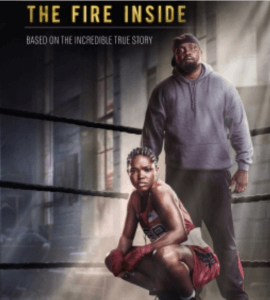
A motion picture based on Claressa Shields titled “The Fire Inside” debuts on Wednesday, Dec. 25, nationwide. Most boxing fans know that Shields has world titles in various weight divisions. But they don’t know about her childhood and how she rose to fame.
Also, Shields (15-0, 3 KOs) will be fighting Danielle Perkins (5-0, 2 KOs) for the undisputed heavyweight world championship on Sunday Feb. 2, at Dort Financial Center in Flint, Michigan. DAZN will stream the Salita Promotions fight card.
“Claressa Shields is shining a spotlight on Flint – first on the big screen and then in the ring on Sunday, February 2,” said event promoter Dmitriy Salita, president of Salita Promotions. “Claressa leads by example. She is a trailblazer and has been an advocate for equality since she was a young lady. This event promises to be one of the most significant sporting and cultural events of the year. You don’t want to miss it, either live, in person or live on DAZN.”
Shields is only 29 years old and turns 30 next March. What more can she accomplish?
To comment on this story in the Fight Forum CLICK HERE
-
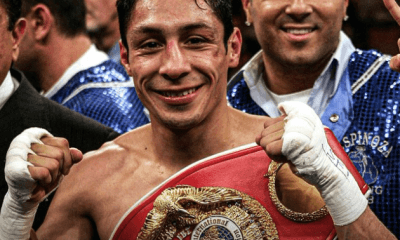
 Featured Articles3 weeks ago
Featured Articles3 weeks agoR.I.P Israel Vazquez who has Passed Away at age 46
-
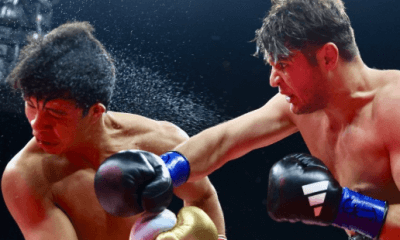
 Featured Articles2 weeks ago
Featured Articles2 weeks agoA Shocker in Tijuana: Bruno Surace KOs Jaime Munguia !!
-
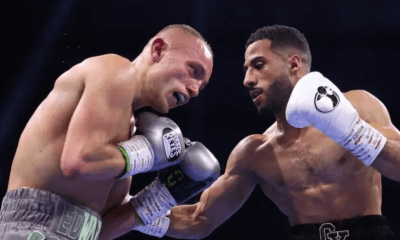
 Featured Articles4 weeks ago
Featured Articles4 weeks agoFighting on His Home Turf, Galal Yafai Pulverizes Sunny Edwards
-
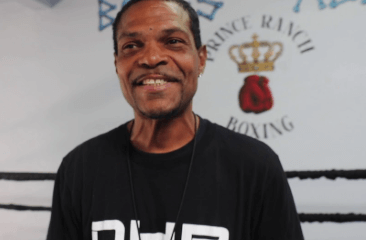
 Featured Articles4 weeks ago
Featured Articles4 weeks agoThe Noted Trainer Kevin Henry, Lucky to Be Alive, Reflects on Devin Haney and More
-
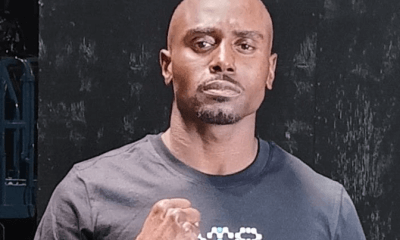
 Featured Articles2 weeks ago
Featured Articles2 weeks agoIntroducing Jaylan Phillips, Boxing’s Palindrome Man
-
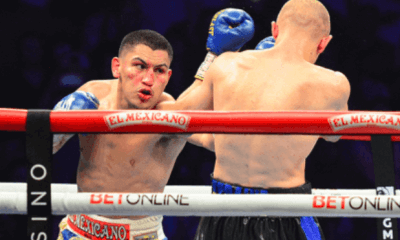
 Featured Articles1 day ago
Featured Articles1 day agoThe Ortiz-Bohachuk Thriller has been named the TSS 2024 Fight of The Year
-
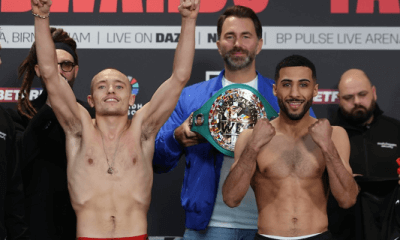
 Featured Articles4 weeks ago
Featured Articles4 weeks agoAvila Perspective, Chap. 306: Flyweight Rumble in England, Ryan Garcia in SoCal
-
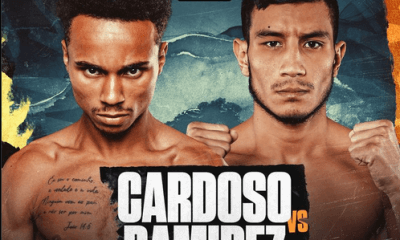
 Featured Articles2 weeks ago
Featured Articles2 weeks agoCardoso, Nunez, and Akitsugi Bring Home the Bacon in Plant City

